In determining the list of 20 largest airports in the world in 2017, we used a statistic called total aviation movement. It represents landings and takeoffs aircraft performed on the airport in question. This is, in our view, the number that best represents the ability of the airport to handle huge numbers of airplanes that use it daily and is perhaps the most important indicator if how busy the airport really is. The other two statistics we also provided are the number of passengers and the amount of cargo each airport handled.
2016 has been very good to the commercial aviation industry, especially the US carriers. Low oil prices combined with a constant demand has been driving profits sky high. The International Air Transport Association (IATA) has predicted a total profit in the sector to be $35.6 billion and 2017 promises to be equally profitable for airline companies. IATA predicts that the profit will be smaller, at $29.8 billion, due to the rising oil prices, but still exceptional since that will be the third year in a row that airlines have achieved a higher return on the investment than the cost of capital, 7.9 to 6.9 percent. In fact, these will be the only three years in the industry’s history that such feat has been achieved.

06photo/Shutterstock.com
The statistics reveal some interesting trends in the aviation industry. For instance, almost all airports on our list of largest airports in the world in 2017 have increased the number of passengers, yet about half of them have declining numbers of total aircraft movement. Translated in layman’s terms, it means that fewer aircraft are transporting more passengers. The trend of using bigger airframes doesn’t apply everywhere, though. Some of the airports on our list are ranked rather low in terms of passenger traffic and cargo traffic both, yet managed to reach a high place on our list due to a larger number of total aircraft movement. These are mainly the airports that cater to destinations that don’t have large airfields or volume of passenger big enough to justify airlines using their premium airplanes, and instead warrant smaller ones, with less capacity. But with plenty of such destinations, the numbers of total aircraft movement keep adding up, propelling airports to a higher ranking.
As a source for our list, we used data from Airports Council International, which usually publishes their findings in September for the previous year. The only available data right now, which is the one we used, is from 2015, but there shouldn’t be major shifts on the list of the largest airports in the world in 2017, barring some unforeseen actions. The list of the Biggest Airports in the World in 2014 is also similar to this one. One thing that may make a dent in US airports’ bottom line is President Trump’s travel ban, which is also causing a huge turmoil on several international airports around the country.
The composition of these 20 largest airports in the world is pretty much what you would expect. 12 of them are in North America, five in Europe, and three in Asia. In terms of countries, 11 are in the United States, two in China, and Canada, Japan, United Kingdom, Germany, France, Turkey, and Netherlands have one each. Let’s see how they are ranked:
20. San Francisco International Airport
Location: San Mateo County, California
Country: United States
Code: SFO/KSFO
Total Aircraft Movement: 429,815
We begin our list of 20 largest airports in the world with San Francisco International Airport. With 50 million passengers, it was ranked 21st in the world among busiest airports by passenger traffic.
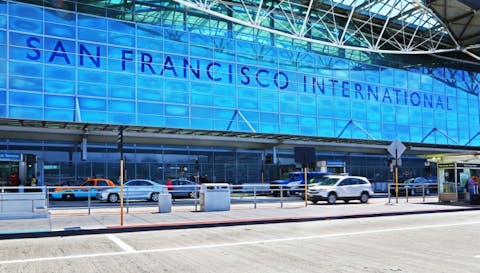
spatuletail/Shutterstock.com
19. John F. Kennedy International Airport
Location: Queens, New York City, New York
Country: United States
Code: JFK/KJFK
Total Aircraft Movement: 438,448
John F. Kennedy International Airport handles 1,283,506 tons of cargo, which makes it 21st in the world among busiest airports by cargo traffic. As for the passenger traffic, it ranked slightly better, at 18th place, with 53.2 million passengers.

Kotsovolos Panagiotis/Shutterstock.com
18. Tokyo International Airport
Location: Ōta, Tokyo
Country: Japan
Code: HND/RJTT
Total Aircraft Movement: 438,542
Tokyo International Airport, also known as Tokyo Haneda Airport handles 75.3 million passengers, ranking it 5th in the world in terms of passengers traffic, a one place slide compared to the previous year. Its 1,173,961 tons of cargo were enough for the 23rd place among cargo handlers.
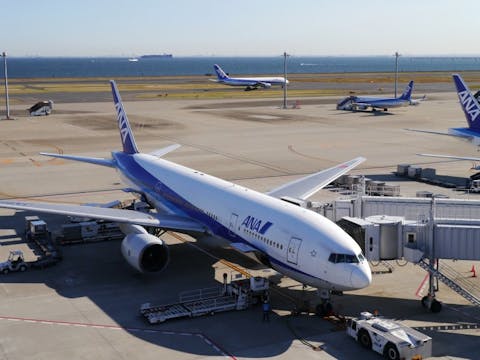
17. Phoenix Sky Harbor International Airport
Location: Phoenix, Arizona
Country: United States
Code: PHX/KPHX
Total Aircraft Movement: 439,035
Phoenix Sky Harbor International Airport handled 44 million passengers, making it 29th busiest airport in the world in passenger traffic. Phoenix isn’t a popular cargo destination, though, and it didn’t merit a place among the top 30 cargo handlers.
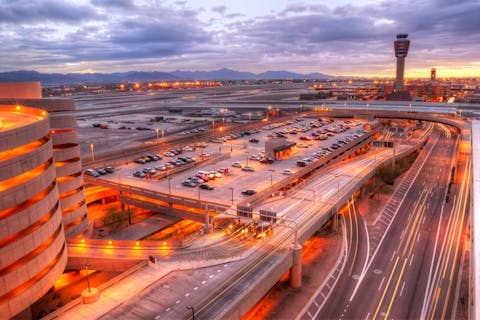
Anton Foltin/Shutterstock.com
16. Toronto Pearson International Airport
Location: Mississauga, Ontario
Country: Canada
Code: YYZ/CYYZ
Total Aircraft Movement: 443,773
Toronto Pearson International Airport handled 41 million passengers, making it the busiest airport in Canada and 33rd busiest in the world in terms of passengers traffic.
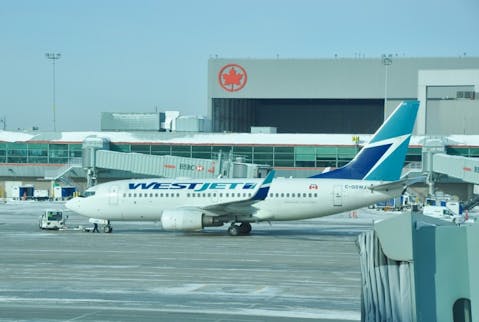
Lester Balajadia/Shutterstock.com
15. Shanghai Pudong International Airport
Location: Pudong, Shanghai
Country: China
Code: PVG/ZSPD
Total Aircraft Movement: 448,213
Shanghai Pudong International Airport handles 3,273,732 tons of cargo, enough for the 3rd place among the of busiest airports by cargo traffic in the world, but with only 60 million passengers it is ranked 13th in terms of passenger traffic. On our list of largest airports in the world in 2017, it ranks 15th.
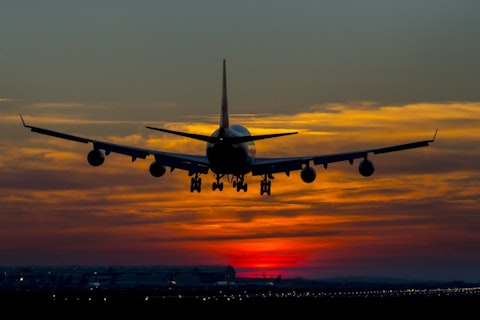
Ian Schofield/Shutterstock.com
14. Atatürk International Airport
Location: Istanbul
Country: Turkey
Code: IST/LTBA
Total Aircraft Movement: 464,865
The first European airport on our list of the largest airports in the world in 2017 is Atatürk International Airport. Premier Turkish airport handles 61.8 million passengers and 771,240 tons of cargo.

alessen/Shutterstock.com
13. Amsterdam Airport
Location: Schiphol Haarlemmermeer, North Holland
Country: Netherlands
Code: AMS/EHAM
Total Aircraft Movement: 465,521
Amsterdam Airport handles 54.9 million passengers and 1,655,353 tons of cargo.

06photo/Shutterstock.com
12. Frankfurt Airport
Location: Frankfurt, Hessen
Country: Germany
Code: FRA/EDDF
Total Aircraft Movement: 468,153
Frankfurt Airport if the biggest airport in Germany. It handles 2,076,734 tons of cargo (9th in the world among the busiest airports by cargo traffic) and 61 million passengers, which makes it third busiest airport by passenger traffic in Europe.
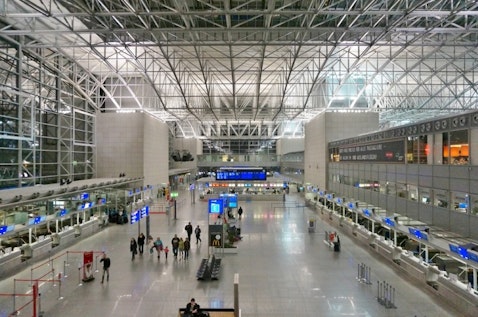
EQRoy/Shutterstock.com
11. London Heathrow Airport
Location: London, England
Country: United Kingdom
Code: LHR/EGLL
Total Aircraft Movement: 474,102
Despite handling more passengers (74.9 million), London Heathrow Airport trails Charles de Gaulle both in terms of cargo (1,591,642 tons) and total aircraft movement.
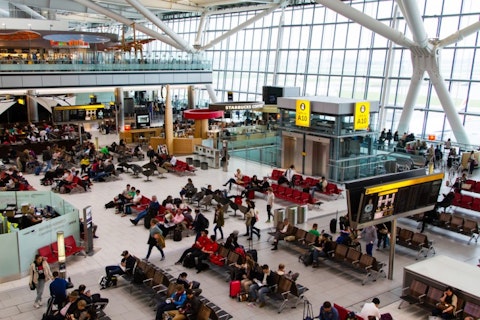
Milosz_M/Shutterstock.com
10. Charles de Gaulle Airport
Location: Paris
Country: France
Code: CDG/LFPG
Total Aircraft Movement: 475,776
Charles de Gaulle Airport in Paris handles 65.7 million passengers annually, as well as 1,861,197 tons of cargo. It is the largest airport in Europe on our list.

Sorbis/Shutterstock.com
9. George Bush Intercontinental Airport
Location: Houston, Texas
Country: United States
Code: IAH/KIAH
Total Aircraft Movement: 502,844
Houston’s George Bush Intercontinental Airport deals with 41.2 million passengers yearly, which is enough for the 28th place on the list of the busiest airports in terms of passenger traffic.
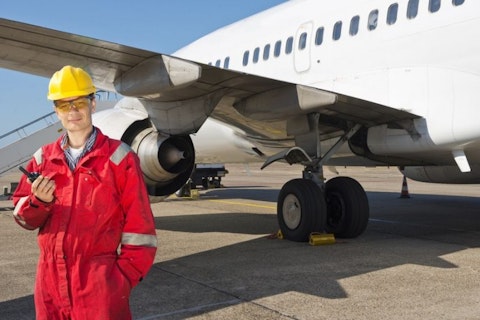
Copyright: 36clicks / 123RF Stock Photo
8. McCarran International Airport
Location: Las Vegas, Nevada
Country: United States
Code: LAS/KLAS
Total Aircraft Movement: 522,399
With 45.3 million passengers, McCarran International Airport in Las Vegas is ranked 26th by the passengers passing through. It isn’t ranked among top 30 airports in terms of cargo traffic but made it to the 8th spot on our list of the 20 largest airports in the world in 2017.
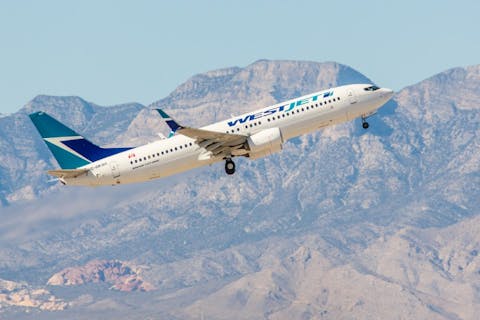
Chris Parypa Photography / Shutterstock.com
7. Charlotte Douglas International Airport
Location: Charlotte, North Carolina
Country: United States
Code: CLT/KCLT
Total Aircraft Movement: 540,944
Charlotte Douglas International Airport is only 27th in the number of passengers, with 44.8 million people using it and it isn’t ranked among top 30 airports in terms of cargo traffic, yet it is 7th in total aircraft movement.
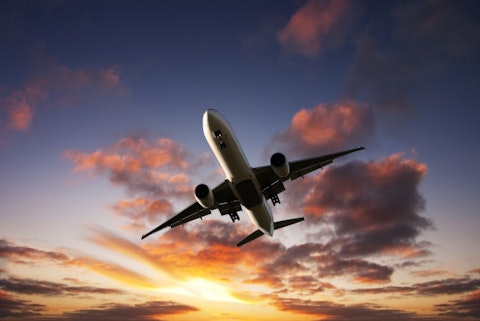
travellight/Shutterstock.com
6. Denver International Airport
Location: Denver, Colorado
Country: United States
Code: DEN/KDEN
Total Aircraft Movement: 541,213
Denver International Airport is ranked 19th in passenger traffic, with 54 million passengers. It’s not among the top 30 busiest airports in cargo traffic.
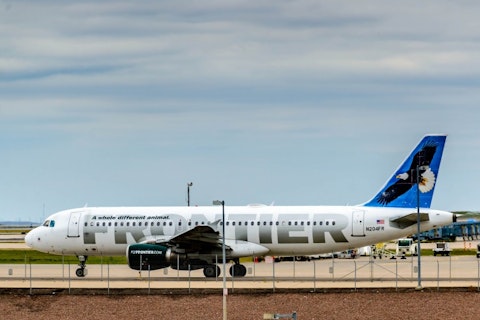
CaseyMartin / Shutterstock.com
5. Beijing Capital International Airport
Location: Chaoyang-Shunyi, Beijing
Country: China
Code: PEK/ZBAA
Total Aircraft Movement: 590,169
Next in line on our list of largest airports in the world in 2017, Beijing Capital International Airport is second in terms of passenger traffic, with 89.9 million passengers and 13th in cargo traffic, with 1,889,830 tons of cargo.
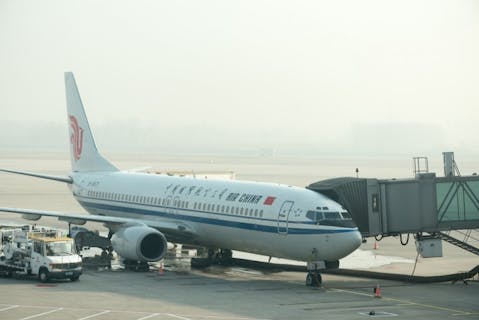
Toni Schmidt/Shutterstock.com
4. Los Angeles International Airport
Location: Los Angeles, California
Country: United States
Code: LAX/KLAX
Total Aircraft Movement: 655,564
Los Angeles International Airport is ranked 12th in cargo traffic, with 1,931,583 tons of cargo and 7th in the world by passenger traffic, with 74.9 million passengers.
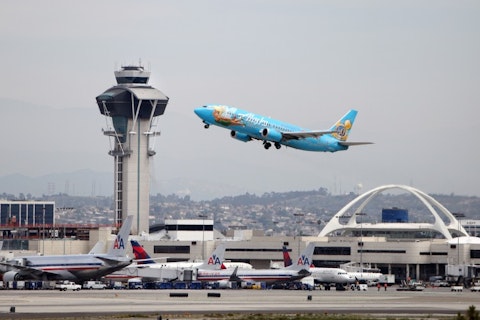
Digital Media Pro/Shutterstock.com
3. Dallas/Fort Worth International Airport
Location: Coppell, Euless, Grapevine, and Irving, Texas
Country: United States
Code: DFW/KDFW
Total Aircraft Movement: 681,244
Dallas/Fort Worth International Airport is 10th among the airports with the largest passenger traffic, and among the largest airports in the world in 2017, having served 76 million people. It ranks 30th for cargo traffic, with 578,906 tons of cargo.
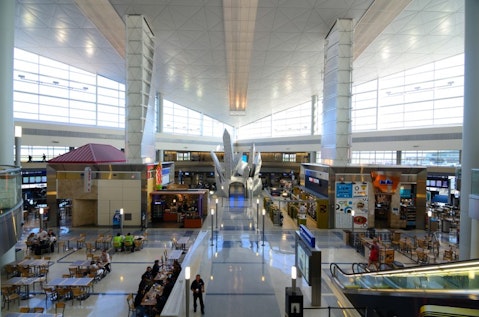
Sean Pavone/Shutterstock.com
2. O’Hare International Airport
Location: Chicago, Illinois
Country: United States
Code: ORD/KORD
Total Aircraft Movement: 875,136
O’Hare International Airport ranks 7th in terms of passengers traffic, with almost 77 million passengers and 16th in terms of cargo traffic, with 1,844,336 tons of cargo.
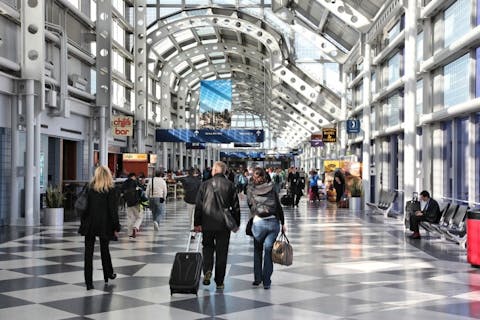
Tupungato/Shutterstock.com
1. Hartsfield-Jackson Atlanta International Airport
Location: Atlanta, Georgia
Country: United States
Code: ATL/KATL
Total Aircraft Movement: 882,497
The title of the largest airport in the world in 2017 goes to Hartsfield-Jackson Atlanta International Airport. The busiest airport in the world also ranks first in terms of passengers, with more that 101 million people walking through its gates.
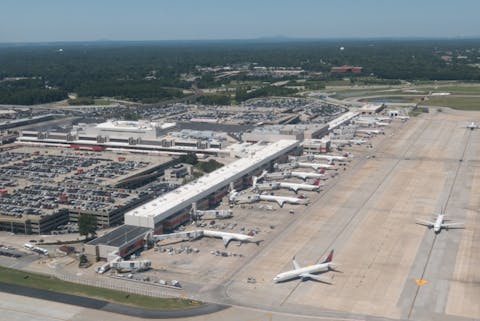
Rob Wilson/Shutterstock.com





